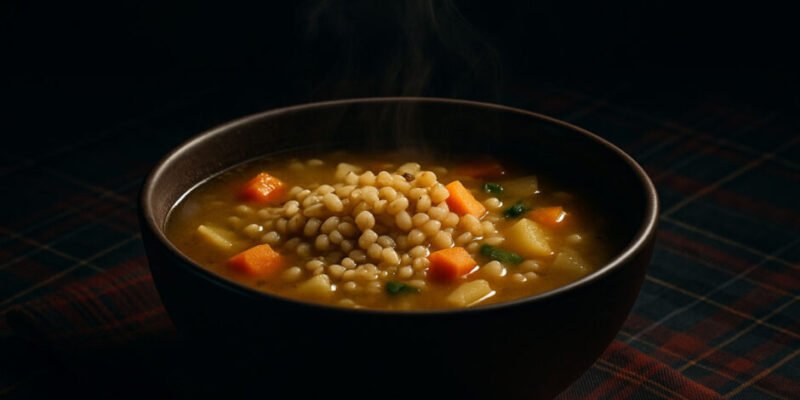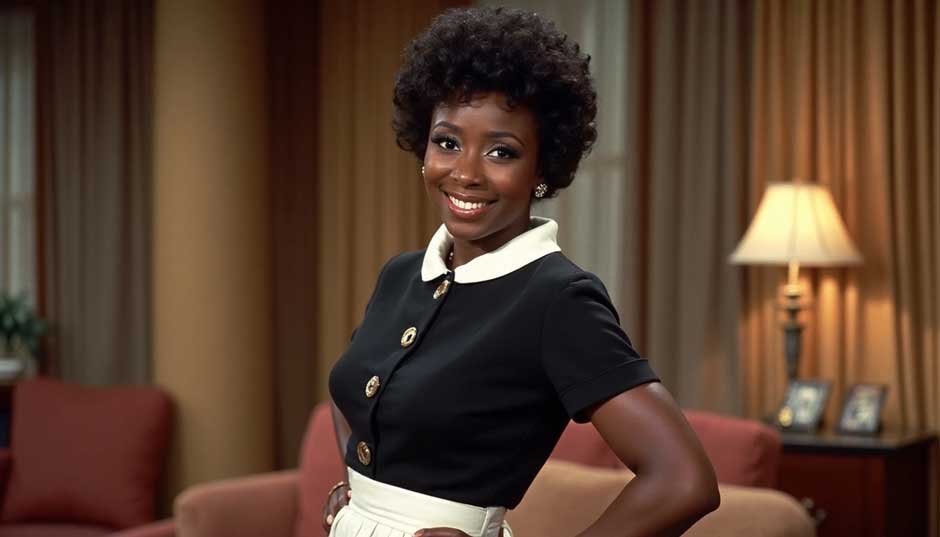What is Scotch Broth Slang? The Baby Reindeer Connection
Right from episode one, “Baby Reindeer” makes it clear that Martha Scott isn’t your average person. When she celebrates her birthday with poor Donny Dunn at that coffee shop, things get uncomfortable fast. What starts as a simple birthday outing quickly turns into something much more awkward.
Martha’s way of saying “Scotch broth” leaves zero doubt about her real intentions. The tone, the timing, the look on her face – none of it has anything to do with ordering food. It’s one of those moments that immediately tells you this character has serious boundary issues.
Viewers outside the UK were especially confused by the whole thing. Social media exploded with people asking if this was some British slang they’d never heard of. The phrase felt too deliberate to be meaningless, but way too weird to be common knowledge.
What made it even more confusing was that Scotch broth actually exists as a proper dish. This double meaning created the perfect recipe for viewer bewilderment. People genuinely thought they were missing some important piece of British culture.
The Traditional Scottish Dish Behind the Name
Real Scotch broth has been warming Scottish bellies since the early 1800s. This isn’t some fancy restaurant creation – it’s proper comfort food that Scottish families have been making for generations. The kind of hearty soup that gets you through brutal winter nights.
Barley sits at the heart of every good Scotch broth recipe. This humble grain does double duty, adding both texture and acting as a natural thickener. It’s what gives the soup that distinctive, satisfying consistency that sets it apart from your average broth.
The meat component usually comes from lamb, mutton, or beef – typically the tougher cuts that need long, slow cooking to become tender. Scottish cooks knew how to make these cheaper cuts sing by giving them time and patience. Hours of simmering transforms tough meat into something incredibly flavorful.
Vegetables round out the holy trinity of Scotch broth ingredients. Root vegetables like carrots, turnips, and potatoes bring natural sweetness and bulk. Cabbage and leeks often join the party later in the cooking process, adding fresh flavors and bright colors to the mix.
The cooking method itself tells you everything about Scottish practicality. Everything goes into one pot and simmers away for hours. No fancy techniques or complicated steps – just good ingredients given time to work their magic together.
Visually, traditional Scotch broth looks nothing like what Martha’s slang might suggest. The finished soup shows off beautiful golden and amber tones from all that slow cooking. It stays relatively thin and brothy, completely different from thick, creamy soups.
Decoding Martha’s Euphemism in Baby Reindeer
Martha’s choice to use “Scotch broth” as her euphemism reveals a lot about how her twisted mind works. She’s not picking random words – she’s deliberately connecting to Donny’s Scottish background, making her request both personal and invasive as hell.
This food metaphor perfectly captures Martha’s approach to inappropriate behavior. Instead of being direct, she hides behind seemingly innocent language that gives her plausible deniability. It’s manipulative communication at its finest, and it sets the tone for everything that follows.
The timing makes everything worse. Who makes sexual requests during a birthday celebration at a coffee shop? Martha’s complete inability to read social situations or respect boundaries becomes crystal clear in this moment. The public setting makes her suggestion even more jarring.
Throughout “Baby Reindeer,” Martha consistently uses bizarre phrases that make everyone uncomfortable. This linguistic weirdness becomes part of her unsettling character profile. She doesn’t talk like normal people, and that’s entirely intentional.
Donny’s Scottish heritage makes the euphemism particularly cruel. Martha isn’t just being inappropriate – she’s weaponizing his cultural identity for her own sexual gratification. This adds another layer of violation to their already messed-up relationship.
The scene works on multiple levels beyond just shocking the audience. It establishes Martha’s problematic behavior right from the start while showing how she uses language to make people uncomfortable. The euphemism becomes a perfect tool for character development.
Is Scotch Broth Actually British Slang for Semen?
Here’s the straight answer: absolutely not. Multiple UK sources have confirmed that “Scotch broth” isn’t recognized British slang for semen. This usage appears to be completely specific to “Baby Reindeer” rather than reflecting any real British speech patterns.
Richard Gadd, the show’s creator, seems to have invented this particular euphemism purely for dramatic effect. Martha needed distinctive dialogue that would set her apart from normal conversation while maintaining the show’s deeply uncomfortable atmosphere. The food metaphor does exactly that.
Real British slang for semen follows completely different patterns. You’ve got direct terms like “spunk” or “jizz,” plus playful phrases like “baby batter” or “man juice.” Food-related euphemisms exist, but they don’t typically involve specific traditional dishes.
The specificity of “Scotch broth” actually works against it becoming real slang. Good slang terms need broad recognition and easy pronunciation. A phrase tied to one specific cultural dish just doesn’t have the universal appeal needed for widespread adoption.
Cultural experts point out that using traditional food names as sexual euphemisms would create more confusion than understanding. Most British people hearing “Scotch broth” would think of the actual soup, not anything sexual.
“Baby Reindeer” represents creative storytelling rather than documentary accuracy about British speech. Writers constantly invent distinctive dialogue to serve their characters and plots, even when that language doesn’t reflect real-world usage.
The Cultural Impact of Pop Culture Slang
TV shows definitely influence how language evolves, though not every invented phrase catches on in the real world. “Baby Reindeer’s” use of “Scotch broth” shows how fictional dialogue can spark genuine linguistic discussions among viewers.
The series generated massive online conversation about the phrase’s meaning and authenticity. Social media filled up with confused viewers sharing their bewilderment about Martha’s strange language choices. This kind of engagement represents the first step toward potential slang adoption.
However, the phrase’s connection to such an uncomfortable character might limit its broader appeal. Slang usually catches on when it feels clever, funny, or useful in everyday conversation. “Scotch broth” carries too much baggage from its fictional origins.
Martha Scott accidentally became a linguistic trendsetter, though probably not in the way anyone would want. Her distinctive speech patterns, including the “Scotch broth” euphemism, created memorable moments that viewers still discuss and analyze.
The phrase exists in this weird linguistic limbo between fictional invention and potential real-world usage. Some viewers might adopt it as an inside joke, but it lacks the organic development that characterizes successful slang evolution.
Pop culture’s influence on language remains unpredictable as hell. Some invented phrases achieve lasting cultural significance, while others stay forever tied to their fictional origins. “Scotch broth” seems destined for the latter category.
Common Slang Terms vs. Scotch Broth
Established slang terms for semen follow patterns that “Scotch broth” completely ignores. Most successful euphemisms have qualities like brevity, humor, or clear metaphorical connections that make them memorable and useful in conversation.
Take “spunk” – it’s short, punchy, and has that distinctive sound that sticks in your head. Its British origins give it cultural authenticity that invented phrases struggle to match. It just works in a way that longer, more complicated phrases don’t.
“Baby batter” succeeds through obvious metaphorical connections. The cooking reference creates a clear visual association while keeping things humorous. This combination of clarity and levity helps such terms gain acceptance and actual usage.
More direct options like “jizz” or “cum” work through pure functionality. These terms serve their purpose in casual conversation without requiring cultural knowledge or context to understand. Sometimes simple is better.
Food-related euphemisms do exist in sexual slang, but they usually involve universal foods or cooking concepts. “Cream” or “sauce” work because they reference common culinary experiences rather than specific regional dishes.
“Scotch broth” fails several key criteria for successful slang adoption. It’s too long for casual conversation, too culturally specific for broad understanding, and too associated with an uncomfortable fictional character.
The phrase’s complexity actually hurts its practical usage. Good slang simplifies communication rather than complicating it. “Scotch broth” requires explanation and context that established terms completely avoid.
Should You Use Scotch Broth as Slang?
Honestly? Probably not. The phrase’s fictional origins and limited recognition create serious potential for misunderstanding and awkwardness in real conversations.
Most people would interpret the phrase literally, thinking of actual soup rather than anything sexual. This could lead to genuinely confusing conversations where you and your listener are operating on completely different wavelengths.
The phrase’s association with “Baby Reindeer’s” uncomfortable themes adds another concern. Using Martha Scott’s language might inadvertently reference her problematic behavior and boundary violations. That’s not exactly the vibe most people want to create.
Regional considerations matter too. While some “Baby Reindeer” viewers might get the reference, plenty of people haven’t seen the show or don’t remember its specific dialogue. This knowledge gap creates communication barriers rather than helping understanding.
Professional and formal contexts would find the phrase particularly inappropriate. Even if people understood the reference, using fictional sexual slang in workplace or academic settings could create serious social and professional problems.
The phrase works best, if at all, as an inside joke among people who share knowledge of its fictional origins. Even then, its effectiveness depends on shared understanding and appropriate context. Most situations would benefit from clearer language choices.
The Legacy of Baby Reindeer’s Linguistic Innovation
“Baby Reindeer’s” contribution to sexual slang will probably remain a footnote in television history rather than a lasting linguistic innovation. The phrase serves its narrative purpose effectively while staying too specific for broader cultural adoption.
The series succeeded in creating memorable, distinctive dialogue that serves character development and plot advancement. Martha’s unusual language choices, including “Scotch broth,” help establish her as an unsettling presence whose communication style reflects her boundary-crossing behavior.
Interestingly, the phrase’s usage introduced international audiences to traditional Scottish cuisine. Many viewers learned about authentic Scotch broth for the first time through their confusion about Martha’s euphemism. That’s an unexpected positive outcome from such an uncomfortable moment.
Internet culture has embraced the phrase as a meme and reference point for discussing the show. Online communities use “Scotch broth” as shorthand for referencing “Baby Reindeer’s” uncomfortable moments and Martha’s inappropriate behavior.
The phrase’s real legacy lies in its effectiveness as a storytelling device rather than its potential as practical slang. It successfully created viewer confusion and discomfort while advancing character development and narrative themes.
Future TV writers might draw inspiration from “Baby Reindeer’s” approach to distinctive dialogue creation. The series demonstrates how invented phrases can serve multiple narrative purposes while generating audience engagement and discussion.
















